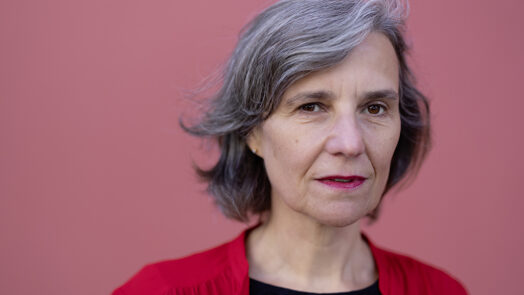| Position | Ivette Löcker |
FILMING AS A SHARED SPACE
by Esther Buss

Ivette Löcker in Berlin in October 2024 © Diagonale / Jürgen Keiper
A couple wrestles with the image of their relationship in front of a running camera. The man and the woman disagree on which of their realities should be shown in the documentary Unsere Zeit wird kommen (2024), and what weight should be given to them. After all, their different backgrounds—Gambia and Austria—inevitably spawn different perspectives on the (cinematic) “us.” Siaka, because he’s had discriminatory experiences, urgently wants to talk about his pain and systematic racism. His wife Victoria, on the other hand, associates their shared “film time” with the desire for an area untouched by life’s daily stresses and strains that bears witness to their love and connectedness. After the filmmaker Ivette Löcker tries from the off to sort out the closely interwoven threads in the debate, Siaka asks, “What creates the film?” He is emphatic about needing to bring the injuries he’s suffered to the movie audience: “The film is about our story, our pain and our good times. We have to talk about it, how the people hurt us. We have to show that in the film. Because thousands of people also have this problem. It’s not only us.”
What is normally the subject of prepatory talks or “off the record,” cannot be kept out of the cinematic frame at this moment. Reality does not allow it. As a key scene, this moment also lays bare Locker’s understanding of documentary work: filming as a shared space, which despite the director’s power to shape it, is decisively co-determined by the protagonists.
The predominant form in Ivette Löcker’s work is the portrait that expands into the picture of a relationship. In most cases, twosomes are at the center: friends, lovers, or couples who have split up, co-dependent couples, companions, and work partners. Above and beyond that, common to Löcker’s films is their extremely empathic and discreet treatment of marginalized perspectives: in Vienna; where she lives, Berlin; and also in more remote locations to which the Slavic studies graduate has a special relationship through frequent journeys. Marina und Sascha, Kohleschiffer (2008) follows a couple who transport coal through Siberia on a barge during the ice-free months, while Anja und Serjoscha (2018) are two young people who rebel against conservative norms and gender stereotypes with performances in Mariupol, near the (then) war front. A more ambivalent image of a relationship is drawn in the portrait condensed to a chamber play, Wenn es blendet, öffne die Augen (2014). In the spatial confines of a cramped prefab highrise apartment in Sankt Petersburg, Löcker lets speak a couple that has been addicted to heroin since the early 1990s, and in doing so, examines the transitional area between (co-)dependency, care, solidarity, and love.
Rather than following rigid (aesthetic) concepts, Löcker’s works are hybrids of everyday observation and a condensed space of communication—whereby everyday life is understood as a state of emergency that has become normal rather than as “normal life.” By avoiding an all-encompassing overview and thesis-like digressions, attention is entirely on the people in front of the camera, who, detached from a larger network of relations, are clearly outlined as individuals and as couples. In their dialogue, as well as through the language of gazes, gestures, and bodies, familiarity, closeness, silent agreements, and failed communication become visible, as do agreement and difference, what is shared and what is inseperable. Even though Löcker usually remains invisible as a director and dispenses with voice-overs, she takes the liberty of developing conversations out of situations with the people she is confronting, and addressing them directly from off-screen.
In some works, the personal, which is expressed through an approach that faces the other, yet never loses sight of the filmmaker’s own position, is articulated more explicitly—to the point of being autobiographical. A childhood memory forms the base of the feature-length debut Nachtschichten (2010), which follows people on their nocturnal journeys through the city of Berlin. Here, too, Löcker’s interest is in the tension between freedom and existential fears, and people on the margins of society: graffiti taggers, a homeless man searching for a place to sleep, a night walker shrouded in loneliness. In Was uns bindet (2017), in a return to her place of origin, the Lungau, in the dual role of filmmaker and protagonist/daughter, Löcker approaches her parents who are separated but live under the same roof.
By focusing on individual experiences, Löcker’s films also open up to social and political perspectives, revealing acute power relations such as the passage of time and generational images—be it the exclusionary mechanisms of white majority society in Unsere Zeit wird kommen or the portrait of the “post-perestroika generation” in Wenn es blendet, öffne die Augen. The present reveals itself as a fragile construct in which the past continues to have an effect and the future is built on shaky ground. On the side of her protagonists, who brave their difficult living conditions with love, shared dreams, wisdom, and humor, Ivette Löcker makes a strong case for keeping an open mind about spaces of possibility.


